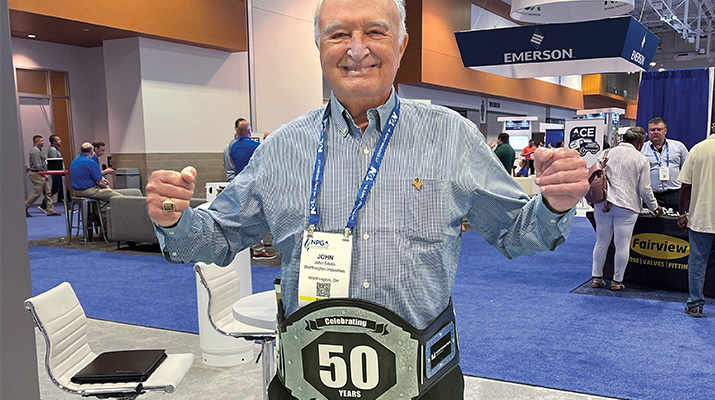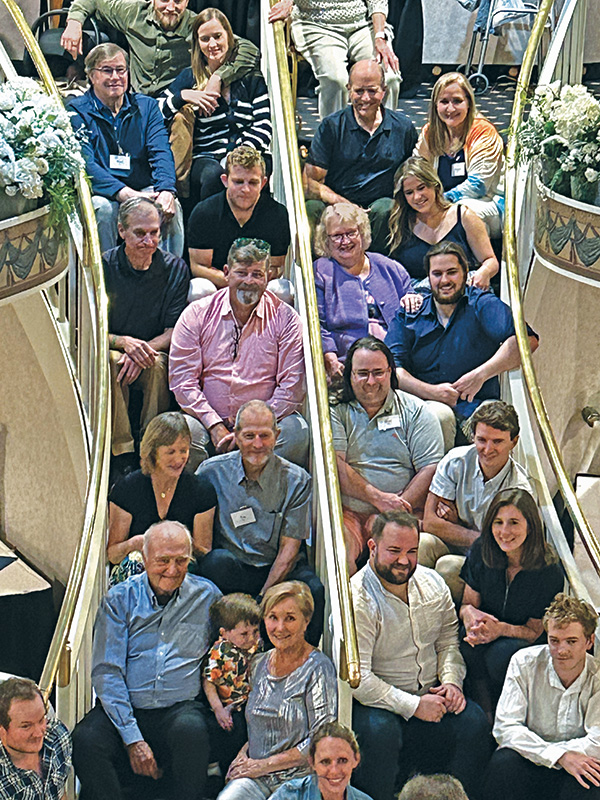John ‘Jack’ Sibilla celebrates 50-plus years in propane
Most people go to work because they have to. John ‘Jack’ Sibilla goes to work because he wants to.
And Sibilla – who turned 90 on May 31 and boasts 52 years and counting as a salesman in the propane business – has no intention of giving it up.
Why would he? He’s having too much fun.
“I always loved what I did,” Sibilla says. “I think that my customers will let me know when I should retire. I like the people too much.”
A rare breed among sales representatives, Sibilla says he prefers to work on commission only, as an independent representative of multiple manufacturers. His first, longest and, by far, biggest contract has been with Worthington Enterprises, coming on board in 1972 just as the Columbus, Ohio-based metals manufacturer tiptoed into the propane cylinder business.
Sibilla’s industry knowledge and trusted relationships proved pivotal, and he helped transform the cylinder business by convincing some of the largest propane gas marketers to adopt aluminum cylinders for forklifts, says Mike Verne, Worthington’s director of sales.

Sibilla boasts 52 years as a salesman in the propane business. (Photo by Vanessa Cox)
Worthington and Sibilla grew up together: Worthington made the products, and Sibilla promoted them. Together, they proved a highly successful combination, each becoming titans in their respective roles.
Sibilla credited some of his early success to his deep understanding of the way his products were used, stemming from his work as a welder in a boiler shop near his Brooklyn, New York, home from the age of 16 through his 20s.
He had no desire to go to college – he ruled out a military career because he feared his mother would’ve had “a nervous breakdown” – but applied anyway to nearby Fordham University. To his surprise, the public-school kid who wasn’t much of a student got in.
It didn’t last; he got kicked out of the Jesuit institution after the first semester. However – in what perhaps should have been an early indication of his future in sales – he talked his way back in and finished strong, earning a philosophy degree.
But he still didn’t want a “career job.” He stayed on at the boiler shop, joined a buddy to weld heavy-construction equipment, then shifted to odd residential construction jobs. “I guess I’m a grunt at heart,” Sibilla says.
Hoping to avoid the draft, he enlisted in the military, spending six months in the Army and seven years in the National Guard.
At last, it was finally time to give the “career job” a try. It didn’t take the folks at Liquid Carbonic long to realize that not only was he smart and personable, but Sibilla actually knew how to work with atmospheric gases and welding equipment. That combination made him a natural salesman, able to command respect by demonstrating what he sold throughout his western New York region.
Sibilla married Inge (now deceased), and they began raising their four children, first in Buffalo, New York, with Liquid Carbonic and later in Lockport, New York, with Sherwood Selpac. Under Sherwood Selpac, he began covering the Eastern Seaboard. He settled for a time in Suffern, New York, but returned to Lockport to sell propane valves and regulators. After a few years, he became a general sales manager, with representatives reporting to him.
But managing people just wasn’t for him. He knew the “sales boss” at Worthington, which in 1971 had acquired the cylinder business from Lenox, and he offered him a job. Sibilla was frank with him – he liked the work but was eager to be his own boss.
“I wanted to be on my own and take on other manufacturers who wanted representation in the welding industry and LP gas industry,” he says. “I wanted to have more things to offer them than just propane cylinders.”

Sibilla turned 90 in May and continues to work in sales. (Photo by Mike Verne)
On Jan. 1, 1972, Sibilla wrote his “letter of independence” from Sherwood, launching the career that matched his charisma and experience with his desire to do things his own way. He was 38, married with car and house payments, a father of four and hungry.
“I couldn’t wait to get started because I knew everybody from selling the oxygen valves and propane valves,” he recalls. “Worthington was the primary mover; they took some of the birth pain out of it and got me going.”
The unconventional formula worked.
“It was enough to keep me busy as hell,” he says.
At the time, Worthington sold only 6-pound aluminum cylinders for plumbing and welding, and it had an aluminum forklift cylinder.
“The aluminum forklift cylinder was in its infancy,” Sibilla says.
Worthington had made a die to produce 20-pound steel cylinders. And Sibilla, who grew up in the shadow of New York City’s skyscrapers, knew exactly where to take them.
With its crowded, narrow streets, metropolitan New York was no place for bulk trucks, and the law required propane to be delivered only in cylinders, which could be exchanged for the empties at 3 or 4 a.m., with no disruption to traffic.
But Sibilla knew that lightweight aluminum cylinders were more durable and a better application than their steel counterparts because their extruded footring was fully welded to the tank. They proved less prone to damage if dropped.
“I was there for that growth,” he says. “I promoted it and grew with it. It spread out all over the nation, eventually.”
“That was my job, and it worked out very well for me and for Worthington.”
In 1972, Sibilla approached a longtime customer, an Ontario, Canada-based major marketer, and convinced them that aluminum forklift cylinders were more durable and practical than steel.
“He didn’t stop there,” Verne says.
Sibilla next approached a New Jersey-based major marketer and sold them on the new concept of a lighter cylinder that was still of high quality.
“With two of the major propane suppliers on board, industry-wide adoption became much easier to achieve,” Verne says.
Over time, Worthington expanded its line to include steel cylinders ranging from 10 pounds to 420 pounds for propane, as well as disposable cylinders for refrigerant gases to fill helium balloons, and 14- and 16-ounce disposable propane tanks typically used for camping.
Sibilla enjoyed bringing customers to the factory, where they could meet the managers and employees who created their products.
The managers could listen to the customers’ needs and answer questions. That was all part of the good customer service he sought to provide.
“They were a great assist to me for sales,” Sibilla recalls. “You’re part of a team; that’s what makes you successful. You can’t do it all by yourself.”
Eventually, he found that if he stocked supplies locally, he could deliver products even faster to customers.
Sibilla acquired a warehouse in Suffern to buy welding supplies and safety equipment from the companies he represented – all in the interest of better customer service.
Sometimes that meant talking buyers out of a product that wasn’t suitable for their needs. “You have a lot of responsibility if you want to be a good rep,” Sibilla says. “The one thing you have to do is be brutally honest about the products, and work hard and be nice. Being nice is probably as important as working hard.”
And when a buyer encounters a problem, you’ve got to take care of it for them.
“I would report, here is the problem, here is the solution, and if you won’t pay for it, I will,” Sibilla explains. “And [Worthington] never failed me. They owned up to every issue they had. And you are going to have issues. Everyone has issues.”
It’s all added up to a rewarding career that he’s still not ready to give up. He lives part of the year in Daytona Beach, Florida, where he plays tennis three times a week as the oldest guy on the court. He spends summers in the Adirondack Mountains around Lake George, New York. He enjoys keeping a hand in sales and says it doesn’t interfere with the life he leads now with his second wife, Judy, whom he married in 1997, and keeping in touch with his children, nine grandchildren and three great-grandchildren.
The plan, he says, is simply to keep going until he can’t anymore.
“It’s a lot of fun,” he says. “I loved my job; it wasn’t work. Worthington was the highlight of my business career. They were so good to me.”
















